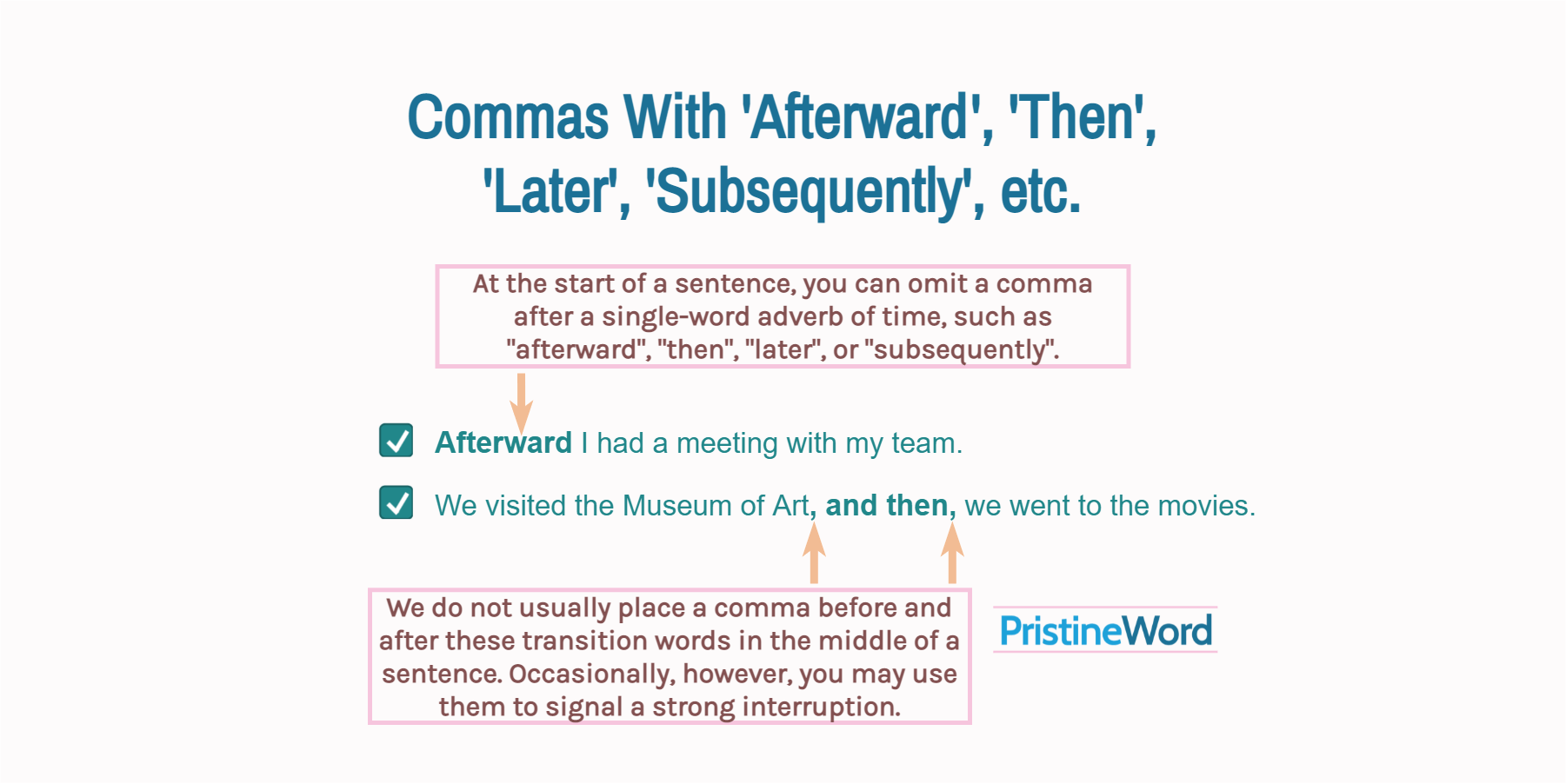At the beginning of a sentence, we add a comma after the conjunctive adverbs "afterward", "then", "and then", "subsequently", "after that", or "later" to indicate that it modifies the complete sentence that follows.
At the start of a sentence, you can omit a comma after a single-word adverb of time, such as "afterward", "then", "later", or "subsequently".
Afterward I had a meeting with my team.
Later we went to the movies.
Karen visited the Central Park; and then she went to a Chinese restaurant in the district.
We do not usually place a comma before and after these transition words in the middle of a sentence. Occasionally, however, you may use them to signal a strong interruption.
Olivia had a delicious pasta dish. She, afterward, enjoyed an amazing chocolate cake.
We visited the Philadelphia Museum of Art, and then we went to the movies.
Contents
1. Differences
The adverbs "afterward", "then", "and then", "subsequently", "after that", or "later" are typically used to indicate that something happens during the period that follows a particular event.
The engineer started his career in India and subsequently worked for a Japanese company.
All these expressions have the same or nearly the same meaning, but there are some differences in terms of connotation and level of formality among them.
- "Then" or "and then" simply mean "the next thing that happened". They are commonly used for routine things. For example: "I got up early and then had breakfast."
- "Afterward" is frequently used to signal that something happened after a more significant event or action. For example: "She studied at Harvard University. Afterward, she went to live in Switzerland." "Then" and "afterward" are very similar and interchangeable in many situations.
- "Subsequently" is a more formal word, typically used in formal contexts or academic writing. Additionally, it may imply a cause-and-effect relationship between two events. For example: "Demand was growing rapidly; subsequently, oil prices soared to a new high."
- "Later" and "after that" are also used to express that something happens after a particular event. "After that" is generally used in conversations or very informal contexts, while "later" can be used in a wider range of circumstances.
- The main difference between "later" and "afterward/then" is that "later" simply indicates that something is happening a point in time later while "afterward/then" implies that something is happening immediately (or almost immediately) after the previous event.
2. When to Use a Comma after 'Then', 'Afterward', 'Later', etc.
Introductory phrases and conjunctive adverbs are almost always followed by commas at the start of a sentence, but there are exceptions. You can skip the commas with single-word adverbs of time, such as "afterward", "then", "later" or "subsequently".
James got up and had breakfast. Then he went out all day with friends.
I went home. Later I called her to explain what the situation was.
While some style guides argue that a comma in situations like these is optional, others say that using it is actually incorrect. As a general rule, you can skip the comma unless it helps clarify the meaning of the sentence or avoid confusion.
We were waiting for everyone else to show up; then we went into the restaurant and got a table.
Yesterday Olivia argued with her husband. Afterward she had a car accident near home.
Recommended: Do you need a comma after "first", "second", etc.?
3. How to Punctuate 'Then', 'Afterward', 'Later', etc. in Mid-sentence
Conjunctive adverbs, such as "afterward", "subsequently", "then", or "later", can be moved within a sentence. For example, you can say:
Later I went to the mall.
I later went to the mall.
I went to the mall later.
Optionally, you can place these expressions between commas in the middle (or at the end) of a sentence to signal a strong interruption.
The party, subsequently, chose delegates to nominate a candidate for president.
Do not use commas if the word is not heavily stressed, or the interruption is just weak.
I met with my friends. We then went to the Central Market to buy some ingredients.
My daughter studied computer engineering. She moved to San Francisco afterward.
If you decide to use commas, be aware that you should add both of them; that is, do not skip a comma and leave the other.
We defined the goals, and then created a project plan.
We defined the goals, and then, created a project plan.

